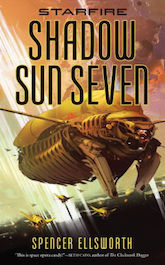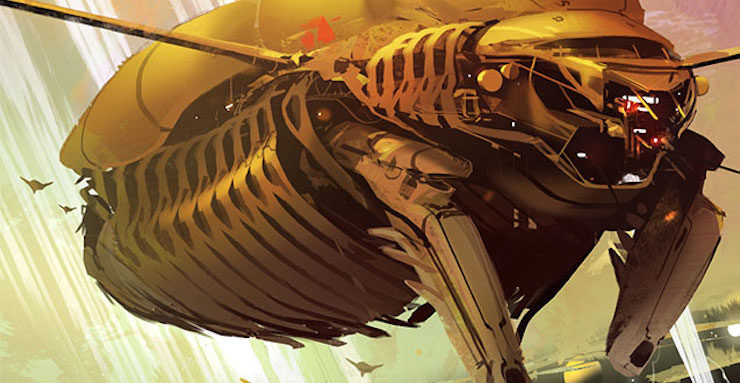Starfire: Shadow Sun Seven is the second book in Spencer Ellsworth’s Starfire trilogy, a space opera reminiscent both of Star Wars and of Simon R. Green’s Deathstalker. In this universe, Jorian “crosses”—part human, part genetically modified ancient powerful race—have long been used as canon fodder against the world-eating Shir by the mostly-human empire.
A Red Peace, the first volume, opened in the aftermath of a successful revolution against the empire led by a Jorian cross calling himself John Starfire. Starfire has capped his success by issuing a secret order to his most senior officers: kill all the full humans. Every single one.
In A Red Peace, drifter and spacer Jaqi discovers this when she comes across a couple of noble kids hiding for their lives. Her conscience, such as it is, won’t let her abandon them (though she wants to) and she ends up fleeing with them across space with her pit-fighter honour-bound ally Z, pursued by Araskar, an officer whose war experiences have left him addicted to a mind-altering drug and more than a little broken. In their flight, they learn that John Starfire has made a terrible bargain with the Shir, as well, and when Araskar’s eyes open to the truth, he joins Jaqi—who, thanks to an unwilling miracle, finds herself catapulted into the position of leading a resistance to John Starfire’s resistance.
Buy the Book


Starfire: Shadow Sun Seven (The Starfire Trilogy)
This is where Shadow Sun Seven opens, with Jaqi, Araskar, Z and the children pursued by pretty much everyone, and in sore need of allies. When their small group is attacked by the insectoid Matakas, Araskar cuts a deal with their queen. He knows where to get a supply of pure oxygen cells, a commodity in short supply in the aftermath of the overthrow of the human Empire. If the Matakas provide the firepower, Araskar with provide the knowledge—and Jaqi and Z the specialist skills—to pull off a heist at a former prison known as Shadow Sun Seven. And, not incidentally, break out a prisoner who spent a year in the Dark Zone—the region of space eaten by the Shir—and survived, and who may be able to give Jaqi some information, or at least some insight, into how she can disrupt John Starfire’s plans regarding humans and the Shir.
Of course, nothing goes entirely to plan.
Middle books of trilogies have a long history of being tricky things to pace: a bridge between the initial introduction to a world and its characters where everything still has the intriguing sheen of newness, and the escalating rush that should be present in the final volume, as everything gathers pace for the climax to the entire three-book narrative. Ellsworth has set himself a difficult challenge here, as Shadow Sun Seven turns from a story of pursuit and desperate survival to a heist narrative.
Heist narratives are particularly unforgiving when it comes to pacing. While a certain amount of scattered pacing could be excused in A Red Peace as a consequence of (and a choice to do with) focusing on a story about running from danger, Shadow Sun Seven lacks this excuse. Unfortunately, it does not succeed in pacing its heist to best effect, failing to utilise the tension of having two viewpoint characters in separate places doing separate heist-related things to the utmost. It does not cut between them at the most perilous cliff-hanger moments—nor does it emphasise the tension in its cuts—instead alternating them in a way that doesn’t exactly maximise the heist-caper potential.
Those viewpoint characters, though, are what makes Shadow Sun Seven worth reading. Once again, Jaqi’s viewpoint is given in the first person voice, while Araskar’s part of the story is told in the third person. Jaqi’s a compelling character, struggling under the weight of expectations (expected to produce miracles), pretty scared by forces arrayed against her, and unable to ignore her conscience. Araskar is less compelling, but his gnarled-veteran (who’s only about four subjective years old) perspective, his struggles with addiction and despair, remain interesting. Araskar’s not in a great place in his life. Araskar’s never been in a great place in his life.
Ellsworth’s worldbuilding continues to grow ever more mind-bendingly batshit. That’s a compliment: giant spacewhales (space slugs? space centipedes?) whose flesh holds compressed oxygen and can be mined by a labour crew; untouched planets at the heart of Shir space; strange miracles and peculiar sentient beings—more space opera should include this level of weird. (It reminds me a little of Kameron Hurley, though without Hurley’s deep commitment to biological squickiness.)
Shadow Sun Seven makes for an interesting middle book, if not an entirely successful one. But to be honest, I’ll have to see how the final instalment, Memory’s Blade, succeeds in wrapping things up before I can render any more telling judgement: Shadow Sun Seven is definitely only one piece of a longer story.
Starfire: Shadow Sun Seven is available from Tor.com Publishing.
Liz Bourke is a cranky queer person who reads books. She holds a Ph.D in Classics from Trinity College, Dublin. Her first book, Sleeping With Monsters, a collection of reviews and criticism, is out now from Aqueduct Press. Find her at her blog, where she’s been known to talk about even more books thanks to her Patreon supporters. Or find her at her Twitter. She supports the work of the Irish Refugee Council and the Abortion Rights Campaign.










